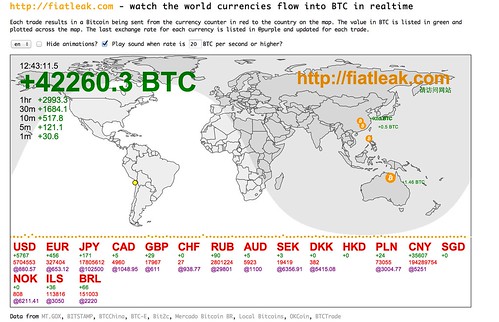
Today the New York Times had a very good article by Marc Andreessen (a former very well-known Internet entrepreneur and now well-respected VC) about why Bitcoin is so important and how it will change the world.
You can read it for yourself here: http://dealbook.nytimes.com/2014/01/21/why-bitcoin-matters/. But if you don’t want to read the long article I will summarize the main points in this post. They are a good reference when I talk to people about why I believe so much in Bitcoin and why I think 2014 will be the Year of the Bitcoin. Of course I will also add a few personal comments.
Similarities to growth of PC and Internet
Marc starts his article with a couple of paragraphs in which he compares the rise of Bitcoin with the start of the personal computer in the 1970s and the start of the Internet in the early 1990s. At first people didn’t understand it, then they start to embrace it and don’t understand why they did not see the powerful promise earlier. Exactly the same as what’s happening with Bitcoin now!
Trust
Bitcoin is a breakthrough in computer science in that it can create trust between untrusted parties over an untrusted network (the Internet). This means that any digital property can be transfered securely, including digital money.
Easy of use
Bitcoin is not easy to use, right now you still need quite some knowledge in order to set up an account to buy Bitcoin or a wallet. But the ease of use is rapidly increasing with new tools and apps. I think that before the end of 2014 most people can set up a wallet on their phone without help of others (incl. putting money on it!).
Volatility
Volatility is often mentioned as a problem for merchants, but it’s not really an issue. Reality is that merchants can accept Bitcoin without actually holding it, but the press does not understand that (yet).
Why would merchants use it?
Why would merchants use it? Simple, if the margin on electronics is about 5% and you pay 2-2.5% in fees to the credit card company, you can double your profit by using Bitcoin. You can also easily accept international payments (for example from customers without a credit card) and there are no chargebacks possible, which eleminates credit card fraud. Apparently 5-10% of all transactions are not accepted because of credit card risk, with Bitcoin you could accept these people as customers.
Anonymous or not?
Bitcoin is pseudonymous not anonymous. It’s a hype that Bitcoin is being used a lot for drugs and weapons because nobody can find out who is buying something or what you are buying. Law enforcement can much more easily trace bitocin than cash or gold.
Classic network effect
Bitcoins is a great example of a classic network effect: the more people use it, the more valuable it is for everyone who uses it (just like a telephone for example). Therefore it will be hard for another crypto currency to replace Bitcoin: this currency would need to have sizable improvements and it needs to happen quickly.
Here I disagree with Marc Andreessen, because I believe a lot of currencies will eventually exist next to each other. It’s not “either/or” but “and/and”. My expectation is that we will eventually have thousands of currencies that can all be exchanged easily into Bitcoin or into other virtual currencies. I’ll probably do a blog post on this as well, it’s something that will change the Bitcoin landscape.
Remittance fees
Every year workers send US$ 400 billion in remittances to family in their home countries, out of which companies like Western Union take 10% or more in transaction fees. Bitcoin will reduce these fees to virtually zero, meaning Bitcoin will raise the quality of life for these families.
Bypass banking system
Bitcoin is a powerful catalyst to bring large numbers of people around the world into the modern economic system. Many countries don’t have well-functioning banking systems yet or people don’t have bank accounts at all (even in the US!). Bitcoin can help people to bypass the banking system and do transactions without the need for a trusted central party like a bank or credit card company.
Micropayments
Micropayments are so far not very cost effective, but Bitcoin allows you to pay fractions of pennies. This could change the way content will be delivered: you don’t need a subscription to a site but can pay a very small amount to read an article on it. This means ads will be less important, or you can decide to pay for an ad free site. For example, I don’t mind paying YouTube a small amount per video if I don’t need to click away their ads. Also spam may disappear if sending an email would cost a fraction of a penny. I believe micropayments will disrupt the Internet in ways that we can’t foresee yet.
For me this article was another sign that Bitcoin is here to stay and that it is slowly becoming more mainstream. I am happy that the emphasis is going away from the price of Bitcoin to what you can do with the platform and the currency.


















